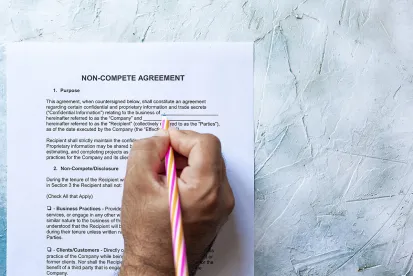Despite California’s general hostility towards post-termination restrictive covenants, the California Court of Appeal, in a recently published opinion, Blue Mountain Enters., LLC v. Owen, 74 Cal.App.5th 537 (1st Dist. Jan. 10, 2022), affirmed that a post-termination customer non-solicitation agreement was enforceable under California Business & Professions Code § 16601.
Under most circumstances, contractual provisions that prevent a person from engaging in a profession, trade, or business, including customer non-solicitation agreements, are void in California. However, section 16601 of the California Business and Professions Code carves out a statutory exception to the rule for individuals selling all of their interest, including goodwill, in a business.
In Blue Mountain, Owen transferred his ownership interest in several real estate and construction-related firms to Blue Mountain Enterprises, LLC, as part of a joint venture with Acolyte Limited. Owen became Blue Mountain’s CEO as part of the transfer. The three year post-termination non-solicitation provision was included only in Owen’s employment contract, but the joint venture, which included Owen’s transfer of his ownership interests, was carried out through four interrelated agreements entered into over the course of several days.
After Owen’s employment was terminated for cause, Owen established a competing construction services company and sent a letter to Blue Mountain customers stating, among other things, that he was launching his new business with “greater perspective, more resources and a much stronger team.” Blue Mountain obtained preliminary and permanent injunctive relief prohibiting Owen from soliciting its customers and prevailed on its motion for summary judgment adjudication of its breach of contract claim.
On appeal, Owen unsuccessfully challenged the trial court’s orders, contending that the non-solicitation covenant did not meet the requirements of section 16601 because the restrictive covenant was contained in his employment agreement and there was no explicit transfer of good will. The Court found that Owen’s transfer of his personal interest into Blue Mountain (a portion of which was later transferred to Acolyte) was sufficient to qualify for the exemption under section 16601. The Court also rejected Owen’s attempt to disavow the customer non-solicitation covenant because it was found in his employment agreement, stating: “Blue Mountain’s ability to enforce the non-solicitation covenant is not undone by the fact that this provision is found in one contract in a multi-contract joint venture rather than another.” Moreover, the Court concluded that an explicit transfer of goodwill was not required to qualify for the exemption under section 16601; rather, the transfer of goodwill could be reasonably inferred.
The Court further concluded that Owen’s letter to Blue Mountain customers did more than simply announce his new business. It was deemed to “petition, importune and entreat” the customers to leave Blue Mounter for better opportunities with Owen’s new company.
By construing the purpose and requirements of section 16601 broadly, the opinion thus shores up one of the few existing bases in California to enforce a customer non-solicitation covenant.



 />i
/>i

